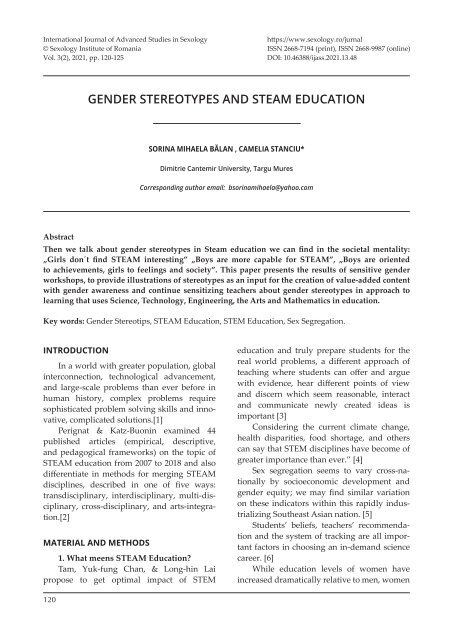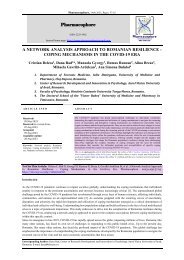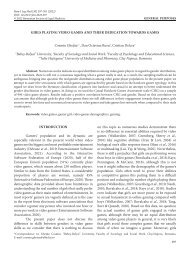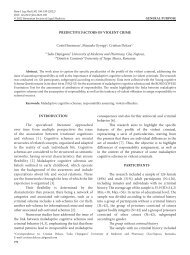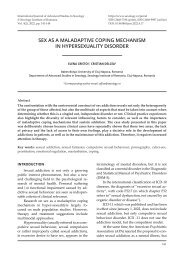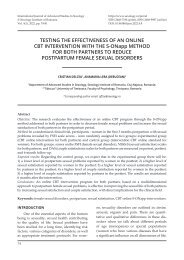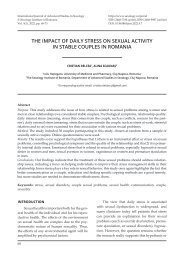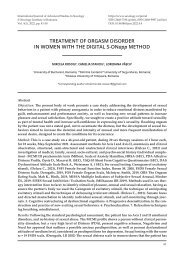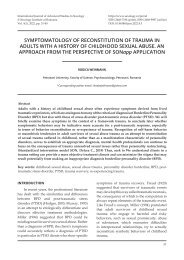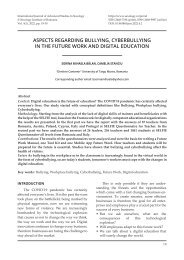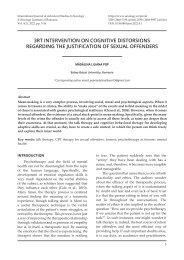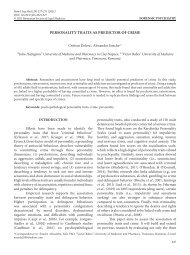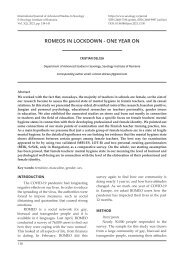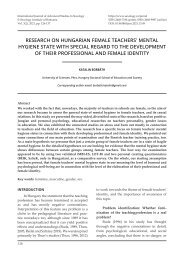Gender Stereotypes and STEAM Education
Then we talk about gender stereotypes in Steam education we can find in the societal mentality: „Girl’s don´t find STEAM interesting” „Boys are more capable for STEAM”, „Boys are oriented to achievements, girls to feelings and society”. This paper presents the results of sensitive gender workshops, to provide illustrations of stereotypes as an input for the creation of value-added content with gender awareness and continue sensitizing teachers about gender stereotypes in approach to learning that uses Science, Technology, Engineering, the Arts and Mathematics in education.
Then we talk about gender stereotypes in Steam education we can find in the societal mentality: „Girl’s don´t find STEAM interesting” „Boys are more capable for STEAM”, „Boys are oriented to achievements, girls to feelings and society”. This paper presents the results of sensitive gender workshops, to provide illustrations of stereotypes as an input for the creation of value-added content with gender awareness and continue sensitizing teachers about gender stereotypes in approach to learning that uses Science, Technology, Engineering, the Arts and Mathematics in education.
- No tags were found...
Create successful ePaper yourself
Turn your PDF publications into a flip-book with our unique Google optimized e-Paper software.
International Journal of Advanced Studies in Sexology<br />
© Sexology Institute of Romania<br />
Vol. 3(2), 2021, pp. 120-125<br />
https://www.sexology.ro/jurnal<br />
ISSN 2668-7194 (print), ISSN 2668-9987 (online)<br />
DOI: 10.46388/ijass.2021.13.48<br />
GENDER STEREOTYPES AND <strong>STEAM</strong> EDUCATION<br />
SORINA MIHAELA BĂLAN , CAMELIA STANCIU*<br />
Dimitrie Cantemir University, Targu Mures<br />
Corresponding author email: bsorinamihaela@yahoo.com<br />
Abstract<br />
Then we talk about gender stereotypes in Steam education we can find in the societal mentality:<br />
„Girls don´t find <strong>STEAM</strong> interesting” „Boys are more capable for <strong>STEAM</strong>”, „Boys are oriented<br />
to achievements, girls to feelings <strong>and</strong> society”. This paper presents the results of sensitive gender<br />
workshops, to provide illustrations of stereotypes as an input for the creation of value-added content<br />
with gender awareness <strong>and</strong> continue sensitizing teachers about gender stereotypes in approach to<br />
learning that uses Science, Technology, Engineering, the Arts <strong>and</strong> Mathematics in education.<br />
Key words: <strong>Gender</strong> Stereotips, <strong>STEAM</strong> <strong>Education</strong>, STEM <strong>Education</strong>, Sex Segregation.<br />
INTRODUCTION<br />
In a world with greater population, global<br />
interconnection, technological advancement,<br />
<strong>and</strong> large-scale problems than ever before in<br />
human history, complex problems require<br />
sophisticated problem solving skills <strong>and</strong> innovative,<br />
complicated solutions.[1]<br />
Perignat & Katz-Buonin examined 44<br />
published articles (empirical, descriptive,<br />
<strong>and</strong> pedagogical frameworks) on the topic of<br />
<strong>STEAM</strong> education from 2007 to 2018 <strong>and</strong> also<br />
differentiate in methods for merging <strong>STEAM</strong><br />
disciplines, described in one of five ways:<br />
transdisciplinary, interdisciplinary, multi-disciplinary,<br />
cross-disciplinary, <strong>and</strong> arts-integration.[2]<br />
MATERIAL AND METHODS<br />
1. What meens <strong>STEAM</strong> <strong>Education</strong>?<br />
Tam, Yuk-fung Chan, & Long-hin Lai<br />
propose to get optimal impact of STEM<br />
education <strong>and</strong> truly prepare students for the<br />
real world problems, a different approach of<br />
teaching where students can offer <strong>and</strong> argue<br />
with evidence, hear different points of view<br />
<strong>and</strong> discern which seem reasonable, interact<br />
<strong>and</strong> communicate newly created ideas is<br />
important [3]<br />
Considering the current climate change,<br />
health disparities, food shortage, <strong>and</strong> others<br />
can say that STEM disciplines have become of<br />
greater importance than ever.” [4]<br />
Sex segregation seems to vary cross-nationally<br />
by socioeconomic development <strong>and</strong><br />
gender equity; we may find similar variation<br />
on these indicators within this rapidly industrializing<br />
Southeast Asian nation. [5]<br />
Students’ beliefs, teachers’ recommendation<br />
<strong>and</strong> the system of tracking are all important<br />
factors in choosing an in-dem<strong>and</strong> science<br />
career. [6]<br />
While education levels of women have<br />
increased dramatically relative to men, women<br />
120
<strong>Gender</strong> stereotypes <strong>and</strong> <strong>STEAM</strong> education<br />
are still greatly underrepresented in Science,<br />
Technology, Engineering, <strong>and</strong> Mathematics<br />
(STEM) college programmer.[7]<br />
2. The stereotyped situations in <strong>STEAM</strong><br />
education<br />
Two workshops were performed in the<br />
field of <strong>STEAM</strong> <strong>Education</strong>. In first workshops<br />
participated 9 students (just girls)<br />
from the psychology faculty attended the<br />
second year, <strong>and</strong> in workshop 2: 16 students,<br />
including 14 girls <strong>and</strong> 2 boys, students from<br />
”Dimitrie Cantemir” University were studying<br />
Psychology, Law, <strong>and</strong> School-teaching.<br />
Workshop facilitators were provided with a<br />
guide to identify common <strong>and</strong> unconscious in<br />
stereotypes of gender in the most homogenous<br />
way as possible. The aims of sensitive gender<br />
workshops was: to provide a framework for<br />
input to encourage local content workshops;<br />
to provide illustrations of stereotypes as an<br />
input for the creation of value-added content<br />
with gender awareness; to continue sensitizing<br />
teachers about gender stereotypes in <strong>STEAM</strong><br />
education.<br />
2.1. Breaking the ice activity<br />
The first activity comprised of the distribution<br />
of paper slips that contained statements on<br />
gender issues. The strips had been cut in half in<br />
various ways so that each piece could be only<br />
matched with its original mate.<br />
In the second activity, participants had to<br />
find the matching half to the piece of paper<br />
they were holding. When they found the right<br />
match, they formed pairs with the person who<br />
had the matching piece. Each person in the<br />
pair then interviewed the other <strong>and</strong> after they<br />
discuss the sentence.<br />
In the third activity, each person in each<br />
pair introduced his or her partner to the group<br />
after they had introduced themselves <strong>and</strong> been<br />
talking about their interests, etc Once they had<br />
introduced themselves, they had to say what<br />
phrase they had been touched by <strong>and</strong> what<br />
they thought of it, if they thought it was true,<br />
why?<br />
Even though most of students agreed that<br />
it was not something of “nature” but of learned<br />
skills, it is worthy to remark that there is still a<br />
high percentage of students that consider that<br />
women cannot work as hard as men.<br />
All participants presented <strong>and</strong> expressed<br />
their opinion freely. In the first group the opinions<br />
were homogeneous, they generally had<br />
the same opinions. In the second group, opinions<br />
were much more divergent <strong>and</strong> each tried<br />
to reasonably support his opinion.<br />
Some of the initial views of the students<br />
are synthesized below:<br />
• G. began the debate stating that “There<br />
are 60,000 anatomic differences between the body of<br />
the woman <strong>and</strong> the man: the most beautiful profession<br />
/ profession is to form life through educated<br />
sittings” (C.G., Psychology, 1st year)<br />
• T. S. say: “There is inequality between<br />
women <strong>and</strong> men. Unfortunately for the same thing<br />
in certain jobs even if women <strong>and</strong> men do the same<br />
job, men are better paid than women. I do not think<br />
men are always right”<br />
• M.A. believes that “Women have the same<br />
rights as men” (MA-, future teacher) N.G. disagrees,<br />
says she was credited with a Muslim family,<br />
<strong>and</strong> women are honored, but she says, “I do not think<br />
we can be 100% equal. Men have certain qualities<br />
<strong>and</strong> women do not have them the other way around.<br />
We are different from each other “(N.G.-Muslimorigin<br />
third year psychology student, DPPD l)<br />
• “In our society, geared towards democracy<br />
<strong>and</strong> equality, I believe that women use gender<br />
inequalities as a pretext to motivate their own<br />
failures. A woman who wants her education will<br />
be educated. A woman who wants to advance in<br />
her career will do everything in her power to get<br />
this done. If he wants a family <strong>and</strong> obligations; is<br />
involved, will establish a family, <strong>and</strong> if not, will<br />
not do so. Although stereotypes exist, they can’t<br />
<strong>and</strong> must not st<strong>and</strong> in the way of a person’s goals<br />
“(B.D.M.)<br />
• P.S.A. says that “gender inequality exists<br />
today. Women are in some devalued areas,<br />
everything being in favor of men. They are not<br />
excluded, but only marginalized. Just as in rural<br />
areas, women are inferior to men because they are<br />
domestic, they have to deal with home <strong>and</strong> children in<br />
general, some of whom are denied the right to work.<br />
I think that even small children are involuntarily<br />
imposing certain stereotypes: women = secretary;<br />
121
BĂLAN <strong>and</strong> STANCIU<br />
man = army; women = sensitivity, emotion; man<br />
= force, protective. Each of these qualities, whether<br />
male or female, must be appreciated by each of the<br />
two parties, to complement each other.” (DPPD<br />
student, first level, 3rd year of psychology)<br />
• G.A.M., the mother of two boys says boys<br />
are disadvantaged, they are apostrophe more often<br />
than girls, sometimes even beaten by teenagers <strong>and</strong><br />
girls are forgiven, even if they are wrong, they also<br />
conclude that “stores have more products for women<br />
than for men, what I do not feel right, I have two<br />
boys, go abroad to shop. For supplies <strong>and</strong> clothes,<br />
because we do not find in our country, women are<br />
more accented. I believe that society is first guilty<br />
of inducing this state of being unequal. Men love<br />
the real part (math-real), women’s human side (the<br />
Romanian-human language). So they say. I say<br />
that it depends very much on how the little child<br />
is educated, it is about temperament, personality,<br />
character, no matter the genre. “<br />
“Inequality is present <strong>and</strong> there will be a long<br />
time,” adds a participant, <strong>and</strong> B.V. says “it is a<br />
controversial topic <strong>and</strong> I think most have a misconception<br />
about the role played by woman <strong>and</strong> man in<br />
society”.<br />
2.2. Riddle activity<br />
The aim of activity has to get participants<br />
to re-think their first assumptions about gender<br />
The facilitator read the riddle to the participants<br />
<strong>and</strong> showed it either on a screen or paper<br />
in order to let participants to read it as many<br />
times as they need. Once the group solved<br />
the riddle, ie. Figures out that the surgeon – a<br />
woman – is the boy’s mother, facilitator leaded<br />
a discussion about the assumptions people<br />
make concerning the professional roles of<br />
women <strong>and</strong> men.<br />
Riddle: “I cannot operate on this child”<br />
• „Deepak <strong>and</strong> his son Arjun live in one of big<br />
cities of India. One Sunday, they take the car to<br />
go to the market. On the way, they have a serious<br />
accident <strong>and</strong> Deepak is instantly killed. His son,<br />
injured <strong>and</strong> unconscious, is rushed to the nearest<br />
hospital.”[8]<br />
Most participants said the surgeon is a<br />
mother, because the father got caught in the<br />
accident although the text does not specify this,<br />
but the name suggested it. Regarding the ethics<br />
of operating or not owning a child, she thinks<br />
that a mother cannot.<br />
• V. believes that the surgeon “can’t operate<br />
because there is intense emotional affection.”<br />
“Because of the emotional shock <strong>and</strong> the likelihood<br />
that you will be mistaken for the technique, in the<br />
child’s life or success will be doubtful” “(C.G).<br />
• M.A.M says that “Mum was the surgeon<br />
<strong>and</strong> could not operate that child because he was<br />
subjectively involved. Perhaps if the father was a<br />
surgeon, he could not”<br />
• To the question “Since a father could operate<br />
<strong>and</strong> a mother did not, a response was,” the surgeon<br />
is allowed to operate the baby, but regardless of<br />
gender, whether it is mother or child’s father, this<br />
/ this will be much subjectively <strong>and</strong> because of feelings<br />
refused surgery “(NG), while another opinion<br />
is that “mother, because of attachment to the child,<br />
can’t emotionally detach from the situation.”<br />
2.3. Reflection on Societal Views about<br />
Women <strong>and</strong> Men’s Roles<br />
The Aim of this activity has to help participants<br />
clarify their personal views <strong>and</strong> beliefs<br />
about the roles sixth reason point out that<br />
teacher have some. For the first activity, facilitators<br />
taped a sheet of paper marked ‘agree’<br />
on one wall of the room <strong>and</strong> a sheet marked<br />
‘disagree’ on the opposite wall.<br />
Participants were said that facilitators<br />
would be reading aloud a series of statements<br />
about the role <strong>and</strong> status of women.<br />
As each statement was read, participants had<br />
to decide whether they agreed or disagreed<br />
with the statement <strong>and</strong> quickly move to the<br />
wall that indicated the opinion they favor.<br />
Those grouped together under the same sign<br />
did discuss their reasons for agreeing or disagreeing<br />
<strong>and</strong> appointed a reporter to share their<br />
reasons with the other group.<br />
At the question “Do you think girls are better<br />
at humanity, <strong>and</strong> boys are better at science?” same<br />
answers has:<br />
• Yes (the woman is sociable <strong>and</strong> action-oriented;<br />
I think the woman is “built” based on<br />
feelings; women are predominantly rational,<br />
<strong>and</strong> men are more attached to the goal; since<br />
primary classes, girls are interested in studying<br />
while boys on technique, skill)<br />
122
<strong>Gender</strong> stereotypes <strong>and</strong> <strong>STEAM</strong> education<br />
• No (I think it’s about everyone’s<br />
mentality <strong>and</strong> his / her ambition; everyone is<br />
different, so sex does not determine your abilities;<br />
they have the same qualities <strong>and</strong> defects;<br />
We are born with the same capabilities that the<br />
menu engages or inhibits; it does not matter<br />
sex in any field)<br />
• There are no good men on the social side<br />
<strong>and</strong> women who are good on the logical side<br />
• It is not m<strong>and</strong>atory. <strong>Gender</strong> is not a determining<br />
factor in terms of knowledge, skills.<br />
• The humanitarian <strong>and</strong> scientific side is<br />
equally developed in women<br />
Question: Why do you think men choose a<br />
<strong>STEAM</strong> profession? Answers:<br />
• Because of their natural nature, it instinctively<br />
comes to them<br />
• Somewhat encouraged from the outside,<br />
the media<br />
• Yes-I think every person has his own<br />
reasons. The difference does not make it the<br />
kind<br />
• It’s not a special choice<br />
• Because of their skills, their skills have<br />
been stimulated since childhood.<br />
• Not only men choose them, they also do<br />
not all choose those professions.<br />
• I do not choose men specially<br />
• The inclinations they find<br />
• That’s what they want<br />
• Because they are based on logic in most<br />
of the time<br />
• Men choose these professions because<br />
they are subject to stereotypes because they are<br />
passionate <strong>and</strong> capable. This statement does<br />
not exclude the competence <strong>and</strong> passions of<br />
women.<br />
• Because they are encouraged to do so<br />
• They have been educated, they have to<br />
turn to the right jobs<br />
Summing up, results show that students<br />
agree about the reasons why boys are more<br />
oriented towards <strong>STEAM</strong>. Some of them are<br />
that boys feel more comfortable with <strong>STEAM</strong><br />
as they have been taught in <strong>STEAM</strong> skills.<br />
2.4. Role Plays to identify <strong>Gender</strong><br />
<strong>Stereotypes</strong> in scholastic situations<br />
This exercise was designed to get from<br />
participants their personal views about<br />
different <strong>Gender</strong> <strong>Stereotypes</strong> treatment identified<br />
in scholastic situations.<br />
We explained to participants that they<br />
would carry out a role play activity to help<br />
them to think about different situations in<br />
which they felt that they received different<br />
treatments due their condition of girl or boy.<br />
As participants rehearsed <strong>and</strong> discussed their<br />
scenarios, facilitator circulated <strong>and</strong> helped<br />
them get through rough patches. Then, they<br />
come together <strong>and</strong> shared their scenario with<br />
the group.<br />
Results show that teachers treat in different<br />
way boys <strong>and</strong> girls, based (<strong>and</strong> perpetuating)<br />
on stereotypes such as that girls are more<br />
fragile <strong>and</strong> gentle (<strong>and</strong> passive) <strong>and</strong> boys more<br />
rude.<br />
2.5. Feedback of activity’s<br />
Following the first Workshop, the participants<br />
expressed their views:<br />
• “The theme was real. <strong>Gender</strong> differences exist<br />
<strong>and</strong> can be overcome by will, freedom of expression,<br />
work <strong>and</strong> education. The choices belong to us, so we<br />
have to choose wisely”<br />
• “I hope that in the near future we will eliminate<br />
the prejudices <strong>and</strong> the stereotypes that we have<br />
today. WOMAN IS BEAUTIFUL AS A MAN! “<br />
• “I liked the subject, I think we would have a<br />
better world if we eliminate the stereotypes, because<br />
anything a man can do can make a woman with<br />
little exceptions. I liked workshop <strong>and</strong> the way this<br />
subject was discussed <strong>and</strong> presented. “<br />
• “E-<strong>STEAM</strong> is a good initiative that I hope<br />
will help the company continue to ignore prejudices<br />
<strong>and</strong> stereotypes. Both women <strong>and</strong> men should be<br />
equal in chances to choose a career. “<br />
• “Inequality between women <strong>and</strong> men exists<br />
on the day of sharpening. Women are devalued very<br />
much. Changing this cause could change in the<br />
future. This cause comes from gr<strong>and</strong>parents’ times.<br />
“(C.R.A.)<br />
• “My opinion is that at the moment the role<br />
of the man <strong>and</strong> the role of the woman is denaturant.<br />
First, taking into account the natural role presented<br />
in the Bible, both men <strong>and</strong> women have predominant,<br />
special qualities, which distinguish them.<br />
Secondly, it is obvious that from a physical point<br />
of view a woman cannot exceed a man’s strength.<br />
Equally, at the psychic level, it is demonstrated that<br />
123
BĂLAN <strong>and</strong> STANCIU<br />
the woman is focused on details <strong>and</strong> the man on the<br />
generalities, in case a problem occurs, need to be<br />
solved. Last but not least, within a family, a woman<br />
naturally fulfills her household chores easily, while<br />
a barbarian is difficult to cope with each of them.<br />
Returning to the special qualities, the woman is<br />
sensitive, tender, patient <strong>and</strong> imam, while the man<br />
presents strength, strength, self-confidence, <strong>and</strong><br />
ease of doing business. (B.V.A.)<br />
• “I think that there is equality between a man<br />
<strong>and</strong> a woman, in general, that if we enter into details<br />
things could degenerate from one person to another,<br />
<strong>and</strong> the conception of each one is related to several<br />
factors starting from the most elementary, the<br />
family <strong>and</strong> here many others - religion, conception,<br />
society, etc. No one stop a woman from pursuing a<br />
career that is considered to be “destined” to men,<br />
<strong>and</strong> if she wants, she is absolutely achievable. From<br />
a legal point of view, we are all equal, the rest are<br />
only perceptions <strong>and</strong> indoctrinated ideas. “<br />
• “In conclusion, inequality between sexes<br />
does not exist in the law, at least in us. Inequality is<br />
something about your own conduct <strong>and</strong> mentality.”<br />
• “I think this subject is very varied <strong>and</strong> it<br />
takes more time to debate it.”<br />
CONCLUSIONS<br />
The stereotypes identified during the<br />
workshop, regarding “personality” attributes<br />
are: girls are more focused on appearance, are<br />
fragile, too emotive since boys are more logical<br />
<strong>and</strong> strong. Regarding way of behaving participants<br />
says that girls are inferior to boys in<br />
sports, are neater <strong>and</strong> better organized, <strong>and</strong> are<br />
more passive, gentler. Regarding the way of<br />
expressing emotions, girls are more emotional,<br />
which might impede them doing their job.<br />
Efforts have been made in recent years to<br />
promote <strong>STEAM</strong> education, but we still live<br />
with stereotypes that are part of the nation’s<br />
culture <strong>and</strong> the way we were raised. <strong>STEAM</strong><br />
education can change the thinking- students<br />
can be engaged in more activities for a better<br />
life together- Women <strong>and</strong> men’s<br />
Professional development should include<br />
methods for modeling <strong>and</strong> fostering creativity<br />
in the classroom. [2]<br />
It’s interesting the point of view of authors<br />
Ho, La, Nguyen, Pha, Vuong, Vuong, Pham,<br />
Hoang & Vuong:”In Confucian cultures, those<br />
who did not have to do h<strong>and</strong>icrafts were usually<br />
government officials, considered to be part of the<br />
intelligence. Such people with letters would have<br />
better resources to secure their children with a<br />
scientific culture, as well as to impose strict disciplines,<br />
manners, <strong>and</strong> labels.”[4]<br />
Increased education may in some ways<br />
heighten <strong>and</strong> in other ways reduce women’s<br />
vulnerability to the health effects of gender<br />
discrimination. [9] [10] [11]<br />
REFERENCES<br />
1. Margaret E. Madden, Marsha Baxter, Heather<br />
Beauchamp, Kimberley Bouchard, Derek<br />
Habermas, Mark Huff, Brian Ladd, Jill Pearon,<br />
Gordon Plague, Rethinking STEM <strong>Education</strong>: An<br />
Interdisciplinary <strong>STEAM</strong> Curriculum, Procedia<br />
Computer Science, Volume 20, 2013, Pages 541-<br />
546, ISSN 1877-0509, https://doi.org/10.1016/j.<br />
procs.2013.09.316 accesed in february 2021 from<br />
https://www.sciencedirect.com/science/article/<br />
pii/S1877050913011162<br />
2. Elaine Perignat, Jen Katz-Buonincontro, <strong>STEAM</strong><br />
in practice <strong>and</strong> research: An integrative literature<br />
review, Thinking Skills <strong>and</strong> Creativity, Volume<br />
31, 2019, Pages 31-43, ISSN 1871-1871, https://doi.<br />
org/10.1016/j.tsc.2018.10.002. accesed in february<br />
2021 from https://www.sciencedirect.com/<br />
science/article/pii/S1871187118302190<br />
3. Hau-lin Tam, Angus Yuk-fung Chan, Oscar<br />
Long-hin Lai, <strong>Gender</strong> stereotyping <strong>and</strong> STEM<br />
education: Girls’ empowerment through<br />
effective ICT training in Hong Kong, Children<br />
<strong>and</strong> Youth Services Review, Volume 119, 2020,<br />
105624, ISSN 0190-7409, https://doi.org/10.1016/j.<br />
childyouth.2020.105624. Accessed in 28.02.2021<br />
from https://www.sciencedirect.com/science/<br />
article/pii/S0190740920320478.<br />
4. Manh-Toan Ho, Viet-Phuong La, Minh-Hoang<br />
Nguyen, Thanh-Hang Pham, Thu-Trang Vuong,<br />
Ha-My Vuong, Hung-Hiep Pham, Anh-Duc<br />
Hoang, Quan-Hoang Vuong, An analytical view<br />
on STEM education <strong>and</strong> outcomes: Examples of the<br />
social gap <strong>and</strong> gender disparity in Vietnam, Children<br />
<strong>and</strong> Youth Services Review, Volume 119, 2020,<br />
105650, ISSN 0190-7409, https://doi.org/10.1016/j.<br />
childyouth.2020.105650. Accessed on February<br />
2021 from https://www.sciencedirect.com/<br />
science/article/pii/S0190740920320739<br />
5. Lara Perez-Felkner, John S. Felkner, Samantha Nix,<br />
Melissa Magalhães, The puzzling relationship<br />
124
<strong>Gender</strong> stereotypes <strong>and</strong> <strong>STEAM</strong> education<br />
between international development <strong>and</strong> gender<br />
equity: The case of STEM postsecondary<br />
education in Cambodia, International Journal<br />
of <strong>Education</strong>al Development, Volume 72, 2020,<br />
102102, ISSN 0738-0593, https://doi.org/10.1016/j.<br />
ijedudev.2019.102102. Accessed at 28.02.2021<br />
from https://www.sciencedirect.com/science/<br />
article/pii/S0738059319300756<br />
6. Gheorghita M. Faitar, Silviu L. Faitar, <strong>Gender</strong> Gap<br />
<strong>and</strong> Stem Career Choices in 21st Century American<br />
<strong>Education</strong>, Procedia - Social <strong>and</strong> Behavioral<br />
Sciences, Volume 106, 2013, Pages 1265-1270,<br />
ISSN 1877-0428, https://doi.org/10.1016/j.<br />
sbspro.2013.12.142. Accesed in 27 02 2021 from<br />
https://www.sciencedirect.com/science/article/<br />
pii/S1877042813047654<br />
7. Judith M. Delaney, Paul J. Devereux,<br />
Underst<strong>and</strong>ing gender differences in STEM:<br />
Evidence from college applications, Economics of<br />
<strong>Education</strong> Review, Volume 72, 2019, Pages 219-<br />
238, ISSN 0272-7757, https://doi.org/10.1016/j.<br />
econedurev.2019.06.002 accessed in february<br />
2021 from https://www.sciencedirect.com/<br />
science/article/pii/S0272775719301761<br />
8. <strong>Gender</strong> Bias Exercise can be accesed at https://<br />
www.coursehero.com/file/21592978/<strong>Gender</strong>-<br />
Bias-Exercise-1/<br />
9. Matthew A. Andersson, Catherine E. Harnois,<br />
Higher exposure, lower vulnerability? The curious<br />
case of education, gender discrimination, <strong>and</strong><br />
Women’s health, Social Science & Medicine, Volume<br />
246, 2020, 112780, ISSN 0277-9536, https://doi.<br />
org/10.1016/j.socscimed.2019.112780. Accesed in<br />
27.02.2021 from https://www.sciencedirect.com/<br />
science/article/pii/S0277953619307750<br />
10. Delcea C., Siserman C., 2020: Validation <strong>and</strong><br />
St<strong>and</strong>ardization of the Questionnaire for<br />
Evaluation of Paraphilic Disorders. Rom J Leg<br />
Med28(1)14-20(2020) DOI:10.4323/rjlm.2020.14.<br />
Romanian Society of Legal Medicine.<br />
11. Delcea C., Muller-Fabian A., Radu C. C., Perju-<br />
Dumbravă D., 2019: Juvenile delinquency<br />
within the forensic context. Rom J Leg Med [27]<br />
366-372 [2019] DOI: 10.4323/rjlm.2019.366. 2019<br />
Romanian Society of Legal Medicine.<br />
125


